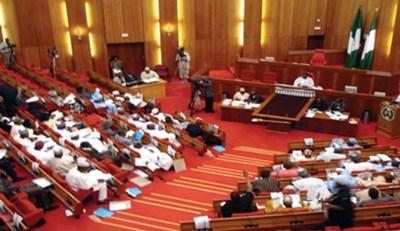Senate Approves Extension of Emergency Rule with Full Military Operation

Senate Chambers
Omololu Ogunmade
After three hours of leadership meeting and eventual general executive session, the Senate Tuesday approved the extension of emergency rule sought by President Goodluck Jonathan on May 13, in Borno, Yobe and Adamawa States for another six months.
The approval which was accompanied by a resolution that full military operation be deployed to the affected states with the aim of combating prevalent insurgency in the area, was predicated on adoption of eight conditions.
The endorsement was a confirmation of THISDAY's exclusive report yesterday that the senators would endorse the emergency rule after deferring decision on it twice last week.
The extension which was unanimously approved without a dissenting voice, laid to rest Northern senators' threat last week to shut down further move by the president to extend the emergency rule.
The decision to endorse the extension yesterday was taken during the executive session held after the earlier two hours of leadership meeting. However, the approval was not automatic as the senators attached eight conditions to it.
These include urging the president to submit supplementary budget to meet any establishment financial requirements needed to combat insurgency in the affected area; drawing up an economic marshall plan for the revival of the economy of the affected states in collaboration with the state governments and full military operation undertaken on sustained basis.
Others are monthly briefing by the ministers of defence and police affairs, service chiefs, national security adviser and director general of the State Security Service on the progress made in the fight against insurgency; special the recruitment and emergency training of screened and vetted youths into armed forces especially members of Civilian Joint Task Force (JTF) for redeployment into troubled zone as well as proper kitting and arming of Nigeria's armed forces deployed to arrest insurgency and adequate welfare care for troops.
Also included in the conditions were a plea to the president to immediately approve intervention funds for the affected states for the purpose of development as well as endorsement of the support of the international community regarding efforts to rescue the abducted students of Government Secondary School, Chibok and further exploration of this co-operation in the overall move to arrest terrorism in the land.
While presenting the motion for the extension, Senate Leader, Senator Victor Ndoma-Egba, recalled that the last extension was approved on November 7, 2013 after the expiration of original proclamation of emergency rule by the president on May 14, last year.
He added further that the Senate recognised that the security situation in the three states remained daunting in the face of persistent attacks by members of Boko Haram on civilian and military targets with alarming casualty rates. He further noted that the approval was done in observance of Section 305 (6c) of the constitution coupled with the output of briefing by service chiefs last week.
"Cognizant of the provision of Section 305 6(c) which states, inter alia: 'provided that the National Assembly may before the expiration of the period of six months aforesaid, extend the period for the proclamation of the state of emergency to remain in force from time to time for a further period of six months by resolution passed in like manner;
"It is recalled that the ministers of defence and police affairs, service chiefs and director general, State Security Service, inspector general of police and national security adviser had briefed the Senate on the state of security in the affected states;
"Accordingly resolved to approve the extension of the proclamation of a state of emergency as contained in the emergency powers general regulations 2013 effective in Adamawa, Borno and Yobe States to remain in force for a further period of six months in accordance with the terms, conditions, content and context as earlier passed by the National Assembly."
The motion was seconded by Senate Minority Leader, Senator George Akume and in an unusual manner, it was not subjected to any debate before it was unanimously passed through a voice vote.
In his remark, Mark thanked his colleagues for their co-operation during the closed door deliberation and hoped that some issues as resolved would quickly be into consideration, noting that they were all affected by the matter.
"I thank you for the pains taken in the discussion that took place and the subsequent approval. Let me also say emphatically here that we have requested that certain issues be resolved as quickly as possible. We stand shoulder to shoulder behind our colleagues from all the states affected. We take this in the same vein that we are all equally affected and that this is a national issue and not a sectional issue in any form," Mark said.
Briefing newsmen at the end of the meeting, Senator Enyinnaya Abaribe, said the advice for the president to submit a supplementary budget with commitment to combat the menace would be the president's discretion, saying if he deems it unnecessary, he is not duty bound to do so.
With the Senate's resolution yesterday, the extension can now take full effect bearing in mind that the House of Representatives had approved the approval last week.
Jonathan first proclaimed state of emergency in the three states on May 14, 2013, citing Section 305 of the 1999 Constitution (as amended), which he said conferred on him the power to make such declaration in any part of the country where there is danger which threatens the peace of the federation.
According to him, persistent insecurity in the affected areas orchestrated by the activities of Boko Haram threatened the existence of the federation.
While the declaration was approved by the National Assembly, the president requested for further extension in November 2013 after its expiration six months after and was accordingly approved by the National Assembly. The last extension expired on May 19.
Source: ThisDay
